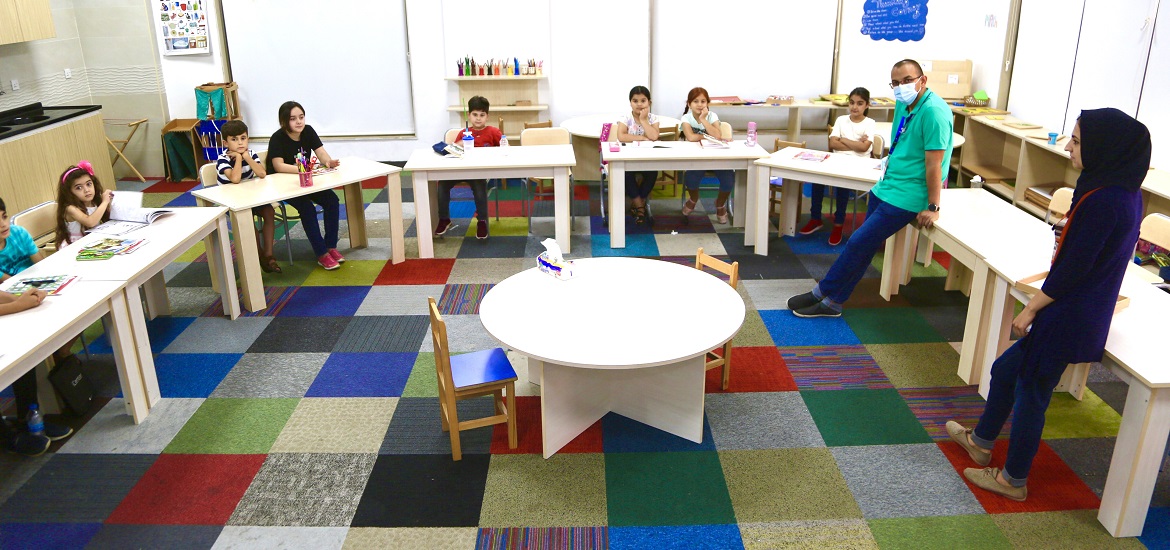Academic Goal

Our Vision
International Montessori School/ Erbil, following the vision of Dr. Maria Montessori and our culture, provides education for life by nourishing every child’s lifetime love of learning. Our age-appropriate environments are designed to teach the whole child and empower each student to realize his or her own potential.
International Montessori School/Erbil recognizes and nurtures the child’s individual academic needs while following the child’s innate desire to create his or herself. We promote the acquisition of skills by providing a cooperative environment where students’ work is both self-directed and director guided, thus developing the child’s independent thinking skills. At International Montessori School/Erbil we strive to cultivate compassion, instill confidence and awaken consciousness for oneself, others and the world that surrounds us.
International Montessori School/Erbil Philosophy
“Our care of children should be governed not by the desire to ‘make them learn things’, but by the endeavor always to keep burning within them the light which is called intelligence.”
Dr. Maria Montessori
The International Montessori School/Erbil community, works to create an environment that inspires children to achieve concentration, self-assurance and love of learning. International Montessori School/Erbil remains dedicated to the Montessori philosophy and method of education through the senses. The organized use of classroom materials promotes the growth of self-discipline and fulfillment of the child’s needs. The materials for the younger children take advantage of the child’s desire to use their hands, to develop the mathematical mind, language and movement. For older children, students direct their own education in a more organized manner and are provided many areas of interest to learn about through study.
Some of the areas that children in a Montessori environment are commonly exposed to include:
· Grace and courtesy
· Use of manners and social customs
· Respect of others and their work
· Respect of their own work
· Care for self, others and materials
· Self-confidence, independence and self-discipline
· Fostering the love of learning
· Building and fostering concentration
· Security and trust
· Sensory skills
· Number sense and an understanding of mathematical concepts
· Language learning through spoken, written and reading
· Guiding language learning to phonic reading and phonograms study
· Promoting curiosity through exploration and discovery with hands doing the work of the mind
· Developing habits of persistence and initiative
· Instill appreciation for the world near and far
· Supporting creative intelligence and imagination
· Positively contribute to community
Dr. Maria Montessori & Montessori Approaches to Learning
In the early 1900s, Dr. Maria Montessori, Italy’s first woman physician, developed educational materials and methods based on her observation that children learn best by doing, not by passively accepting other people’s ideas and pre-existing knowledge. Dr. Montessori believed learning should occur in multi-age classrooms where children at various stages of development learn from and with each other. Her advice was always, “Follow the child.”
The Montessori approach succeeds because it draws its principles from the natural development of the child. The first level of development is known as the First Plane of Development and occurs from birth to age 6. At this stage, children are sensorial explorers, constructing their intellects by absorbing every aspect of their environment, their language and their culture. From age 6 to 12, the Second Plane of Development, children become conceptual explorers. They develop their powers of reason, abstraction and imagination, and apply their knowledge to discover and expand their worlds further. This is evident in the classroom environment as well as in the development of their social interactions. Schools are organized to reflect these stages; PrePrimary 18 months – approximately 3 years, Primary classrooms 3-6 years, Lower Elementary 6-9 years and Upper Elementary 9-12 years.
The Montessori guide’s role is to inspire, “enthusing (the child) to her inner most core.” (Dr. Maria Montessori, from To Educate the Human Potential). The classroom guide creates a dynamic classroom where children are free to work and explore in an orderly environment; s/he is there to help and encourage the children in their efforts, allowing them to develop self-confidence and inner discipline. Knowing how to observe constructively and when to intervene is one of the most important talents the Montessori guide acquires through Montessori education and experience.





